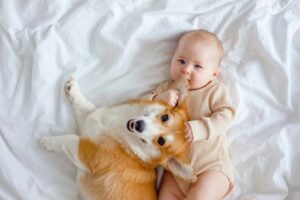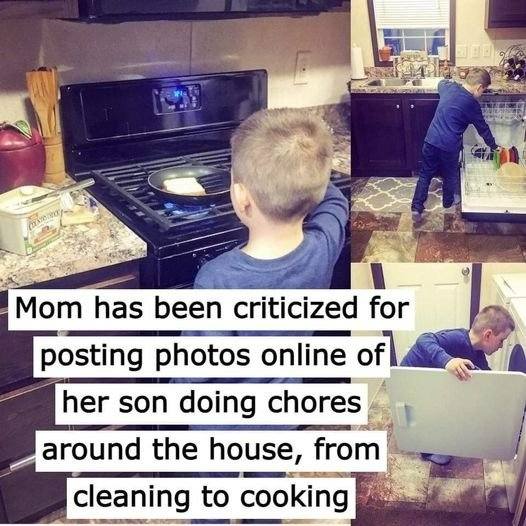Mother criticizes animal enthusiasts, arguing that the phrase “fur babies” constitutes “an affront to motherhood.”
A segment of animal enthusiasts takes offense at a mother of three children who deems referring to pets as “fur babies” as “an insult to moms.”
Defined as a form of endearment by pet owners who view their four-legged companions as integral members of their family, “fur babies” is described by the Cambridge Dictionary as “a pet, particularly one that is cherished and cared for as if it were a baby.”
Challenging the notion of “fur babies” as a legitimate term in the English lexicon, a woman, while acknowledging the potential perception of sounding “self-righteous,” has incited a flurry of reactions from the online community by condemning pet owners with a sanctimonious tone.
The discourse reflects a widening schism between individuals who regard their pets as akin to offspring and those who maintain a strictly animalistic perspective. As per Forbes, a staggering 85 percent of dog owners and 76 percent of cat owners affirm their pets’ status as integral family members. In 2022, Americans lavished $136.8 billion on their beloved companions, a notable uptick from the $123.6 billion spent in 2021.
A separate survey polling 2,000 cat and dog owners reveals that 81 percent extend treatment to their pets on par with human companions, with 71 percent routinely prioritizing their pets’ needs over their own.
Conducted on behalf of Chewy, the study highlights that 47 percent affectionately dub their pets as “baby,” while one in three proudly identifies as their fur baby’s “parent.”
Elizabeth Broadbent, decrying such terminology as an affront to motherhood, asserts, “That is an insult to moms.”
In a poignant narrative penned during the summer of 2022 for an online publication, Broadbent implores pet owners to relinquish the habit of labeling their pets as “fur babies.”
As a mother of three with two dogs under her care, Broadbent staunchly maintains, “Kids and dogs are not the same.” “…But never did we refer to those cherished canines as ‘furkids’ or ‘furbabies’. Dogs, last I checked, are not human.” She continues, “Your puppy is not your offspring, so cease characterizing him as such. With three children of my own now, I can confidently assert—kids and dogs are not interchangeable.”

The Facebook post sparked a lively discussion among online users, who voiced their strong opinions about the matter.
One commenter expressed, “Seems like she’s got a lot of time to spare… I reckon everyone knows the distinctions. I’ve got two kids and adore my furry companion,” while another chimed in with, “She’s spot on, they’re not identical. That’s why dogs are fur babies, children are skin puppies, and youngsters are baby goats.”
A third individual shared, “Our beloved dogs are like fluffy babies, the epitome of loyalty when treated with affection… this lady’s request is misguided and unnecessary in a free society.”
Broadbent elaborated on how she secured her home against hazards for both children and pets. For childproofing, she mentioned removing “strangulation risks,” stowing away “cleaning products,” and installing “safety locks on cabinets.”
In terms of puppy-proofing, she outlined steps like eliminating chewable items, relocating toxic plants, and providing suitable chew toys. However, according to The American Kennel Club, she overlooked several critical pet-proofing measures, such as:
- Removing or concealing all potential chewing hazards like cords, plants, food, and medications.
- Safely storing cleaning supplies.
- Using childproof latches to secure cabinets.
- Preventing potential strangulation by raising blinds.
Nevertheless, Broadbent concurred that “pet ownership entails a significant commitment and should be undertaken only by those genuinely willing to care for an animal throughout its lifespan.” While noting that “you can almost neglect your dog,” she added, “You’re responsible for your dog… well, until you’re not, because you can always leave. Before my husband and I had children, we frequently traveled, dropping our pups off at the doggie spa, indulging them in extra playground time, and jetting off guilt-free.”
Broadbent aligns with the 60 percent of people who don’t consider their pets when planning vacations. However, while only 40 percent reported that their pets influence their travel choices, “a majority (62%) expressed a desire to bring their pets along ‘all of the time’ or ‘most of the time’ when traveling.”
Dr. Katy Nelson, a senior veterinarian at Chewy, remarked, “Pets have become integral to our lives, so it’s unsurprising to witness their rightful elevation within households. This reflects the broader trend of ‘pet prioritization,’ where we place our pets’ needs ahead of our own when making significant life decisions or organizing our social calendars and daily routines.”
![]()






